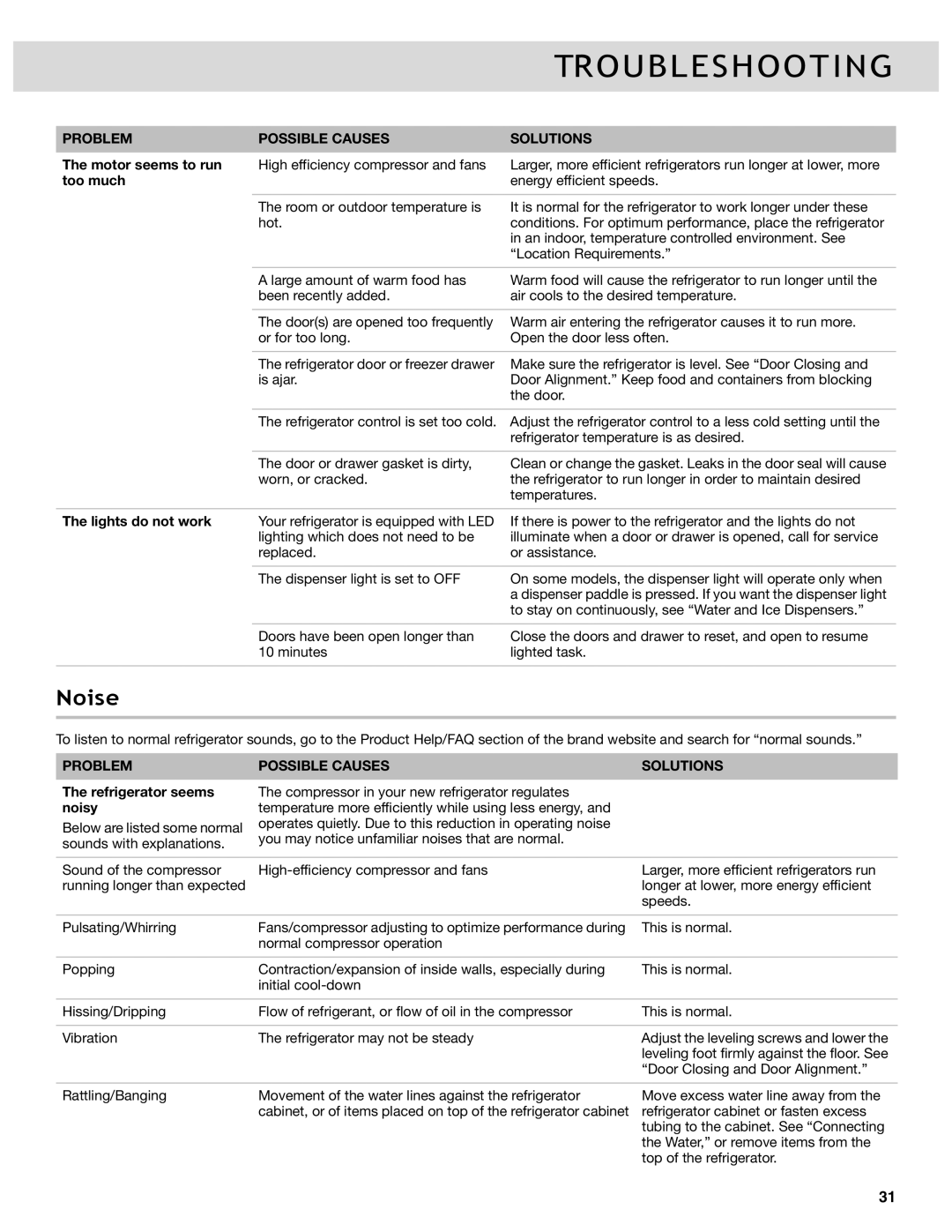
|
|
| TROUBLESHOOTING | |
|
|
|
|
|
|
|
|
| |
| PROBLEM | POSSIBLE CAUSES | SOLUTIONS |
|
|
|
|
|
|
| The motor seems to run | High efficiency compressor and fans | Larger, more efficient refrigerators run longer at lower, more | |
| too much |
| energy efficient speeds. | |
|
|
|
|
|
|
| The room or outdoor temperature is | It is normal for the refrigerator to work longer under these | |
|
| hot. | conditions. For optimum performance, place the refrigerator | |
|
|
| in an indoor, temperature controlled environment. See | |
|
|
| “Location Requirements.” | |
|
|
|
|
|
|
| A large amount of warm food has | Warm food will cause the refrigerator to run longer until the | |
|
| been recently added. | air cools to the desired temperature. | |
|
|
|
|
|
|
| The door(s) are opened too frequently | Warm air entering the refrigerator causes it to run more. | |
|
| or for too long. | Open the door less often. | |
|
|
|
|
|
|
| The refrigerator door or freezer drawer | Make sure the refrigerator is level. See “Door Closing and | |
|
| is ajar. | Door Alignment.” Keep food and containers from blocking | |
|
|
| the door. | |
|
|
|
| |
|
| The refrigerator control is set too cold. Adjust the refrigerator control to a less cold setting until the | ||
|
|
| refrigerator temperature is as desired. | |
|
|
|
|
|
|
| The door or drawer gasket is dirty, | Clean or change the gasket. Leaks in the door seal will cause | |
|
| worn, or cracked. | the refrigerator to run longer in order to maintain desired | |
|
|
| temperatures. | |
|
|
|
|
|
| The lights do not work | Your refrigerator is equipped with LED | If there is power to the refrigerator and the lights do not | |
|
| lighting which does not need to be | illuminate when a door or drawer is opened, call for service | |
|
| replaced. | or assistance. | |
|
|
|
|
|
|
| The dispenser light is set to OFF | On some models, the dispenser light will operate only when | |
|
|
| a dispenser paddle is pressed. If you want the dispenser light | |
|
|
| to stay on continuously, see “Water and Ice Dispensers.” | |
Doors have been open longer than 10 minutes
Close the doors and drawer to reset, and open to resume lighted task.
Noise
To listen to normal refrigerator sounds, go to the Product Help/FAQ section of the brand website and search for “normal sounds.”
PROBLEM | POSSIBLE CAUSES | SOLUTIONS |
|
|
|
The refrigerator seems | The compressor in your new refrigerator regulates |
|
noisy | temperature more efficiently while using less energy, and |
|
Below are listed some normal | operates quietly. Due to this reduction in operating noise |
|
you may notice unfamiliar noises that are normal. |
| |
sounds with explanations. |
| |
|
| |
|
|
|
Sound of the compressor | Larger, more efficient refrigerators run | |
running longer than expected |
| longer at lower, more energy efficient |
|
| speeds. |
|
|
|
Pulsating/Whirring | Fans/compressor adjusting to optimize performance during | This is normal. |
| normal compressor operation |
|
|
|
|
Popping | Contraction/expansion of inside walls, especially during | This is normal. |
| initial |
|
|
|
|
Hissing/Dripping | Flow of refrigerant, or flow of oil in the compressor | This is normal. |
|
|
|
Vibration | The refrigerator may not be steady | Adjust the leveling screws and lower the |
|
| leveling foot firmly against the floor. See |
|
| “Door Closing and Door Alignment.” |
Rattling/Banging | Movement of the water lines against the refrigerator |
| cabinet, or of items placed on top of the refrigerator cabinet |
Move excess water line away from the refrigerator cabinet or fasten excess tubing to the cabinet. See “Connecting the Water,” or remove items from the top of the refrigerator.
31
